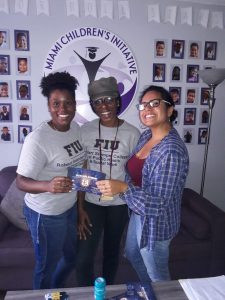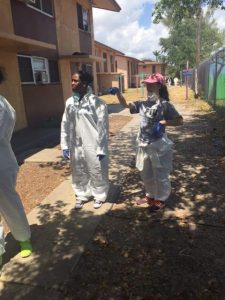–By Jessica Drouet, for FIU News
Going into a stranger’s home is not necessarily an experience most students anticipate being part of their master’s degree. But for public health students who take part in field research, that is a vital component of their education.

“It is important that students have the opportunity to get real field experience as students,” said senior community-based mentor Claudia Pinzon-Iregui. “They are the ones who will continue to move the research forward, and we are here to guide them as they become public health leaders.”
Currently, Pinzon is leading three master’s students in a study about pest control in Miami’s Liberty City. Called The Great Indoors, the research looks to alleviate health issues such as asthma in children living under conditions that include cockroach infestations in their homes and rats in the building.
One of the students is Melissa Antoine, a graduate student in the Health Promotion and Disease Prevention Department who is in the master of public health program with a concentration in maternal and child health program. The opportunity to engage in field research is giving her the opportunity to better understand the community she wants to help as she considers continuing her education by going to medical school.
“I thought it would be really easy to do this research because it’s a good opportunity for the community but our target population didn’t want help. They didn’t trust it,” said Antoine. “While it was hard in the beginning, our participants have been so grateful, and they now understand we are trying to help them. I just never realized it would be hard to get the participants to get involved.”
The students are also gaining knowledge that could not be learned in a classroom setting. Working in health promotion and disease prevention, and particularly in maternal and child health, means working closely with struggling communities and facing health disparities that many turn a blind eye to.
“It is important that students understand the needs that various communities live with and that they can even put a face to the causes they are trying to alleviate,” said Consuelo Beck-Sague, associate professor who leads the maternal and child health program. “When you see the reality in which the most vulnerable children in our society are living, that is a human rights crisis, and we need to open our eyes and our students’ eyes to the realities that exist so that we can help improve health and living conditions for all.”

Students participate in pest clean-up as part of The Great Indoors project
While doing field research, students learn how to speak to participants and gain trust. They gain firsthand experience in collecting data and to differentiate what is important to the study and what needs to be analyzed.
“When you learn something in the classroom, but you don’t use it, it makes it harder to remember. The research is allowing me to implement what I learned in my biostatistics class,” added Valentina Osorio, who is also taking the MPH with a concentration in maternal and child health and working on The Great Indoors project. “I got to go into the field, analyze data and understand the results – that is the full public health experience.”
Field research and community-based research moves the science forward – giving participants and communities opportunities to live better, healthier lives.
“For my students, I hope that they learn a lot from this experience. It not just about research – it is about life,” said Pinzon. “One mother declined the stipend that participants receive to compensate them for their time. She said she should be giving us money for the improvement in her home. That recognition is really impactful, and it shows the value in our work.”
To learn about how you can support programs at FIU that have a direct impact in the community, visit NextHorizon.FIU.edu.
